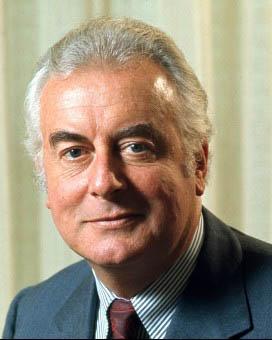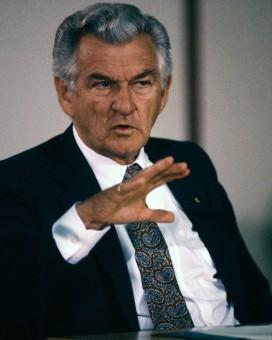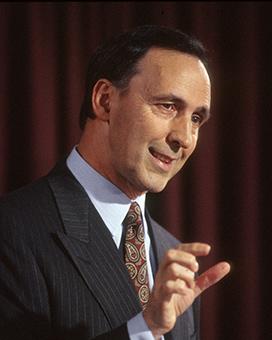John Malcolm Fraser’s term as Prime Minister ended when Bob Hawke was sworn in on 11 March 1983 after Labor won the federal election. Fraser resigned from parliament on 31 March 1983.
Fraser became a prominent figure in Australia’s diplomatic relations in the following decades. In 1984 and 1985, he held fellowships at 2 US institutions: the American Enterprise Institute for Public Policy Research and then the Weatherhead Center for International Affairs at Harvard University.
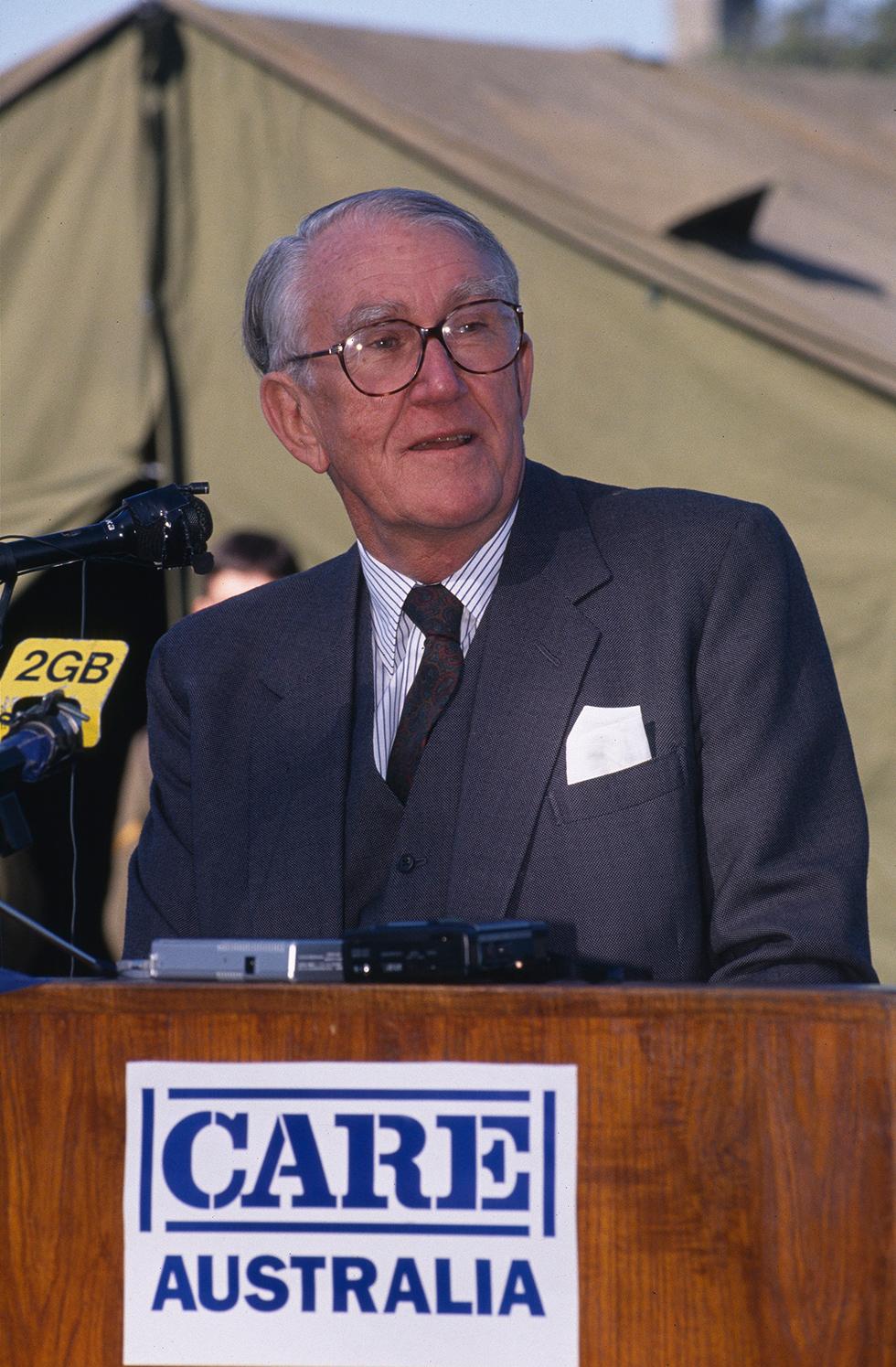
Malcolm Fraser giving a press conference as president of CARE International, a network of humanitarian aid organisations, 1993. NAA: A6135, K25/5/93/109
Fraser's first major international role concerned United Nations and Commonwealth efforts to further the process of dialogue and reform in South Africa to achieve the end of apartheid. In 1985, Fraser was chairman of the United Nations Panel of Eminent Persons on the Role of Transnational Corporations in South Africa and, from October 1985 to August 1986, he jointly chaired the Commonwealth Group of Eminent Persons against Apartheid in South Africa. He also played other roles in ending apartheid, including lobbying the US Congress to impose sanctions on South Africa. From 1989 to 1990, he chaired the United Nations Secretary-General’s Expert Group on African Commodity Issues.
In 1987, Malcolm Fraser formed CARE Australia as part of the international CARE network of humanitarian aid organisations. He was chairman from 1987 until 2002, when William Deane succeeded him. Fraser was also president of CARE International from 1990 to 1995, and its vice-president for the next 4 years.
In July 1996, Prime Minister John Howard despatched Fraser to Africa to lobby support for Australia’s candidacy for a permanent seat on the United Nations Security Council. Fraser visited Zimbabwe in Southern Africa and Ghana in West Africa, and was a guest at the Heads of Government Meeting of the Organization of African Unity in Yaoundé, Cameroon.
Fraser was a member of the Commonwealth observers group in Pakistan for the October 1993 election, and visited Tanzania in October 1995 and Bangladesh in June 1996. He also led the observer mission for the Pakistan national election on 3 February 1997. This election was held after the government of Prime Minister Benazir Bhutto had been dismissed by President Farooq Leghari the previous November.
In April 1999, during the Yugoslav civil war, the Minister for Foreign Affairs Alexander Downer announced the appointment of Fraser as the government’s special envoy to Yugoslavia to seek the release from prison of CARE Australia workers Steve Pratt and Peter Wallace. The aid workers had been tried and sentenced to long prison terms, but Fraser’s negotiations were eventually successful. After the men were released in September 1999, Fraser joined with Nelson Mandela, United Nations Secretary-General Kofi Annan, and Finnish President Martti Ahtisaari to successfully negotiate the release of the third CARE worker, Yugoslav Branko Yelen.
In 1988, Fraser was awarded the Companion of the Order of Australia and in November 2000, he was awarded Australia’s Human Rights Medal for his contribution to the advancement of human rights in Australia and internationally.
On 26 June 2001, Malcolm and Tamie Fraser were guests at a dinner at The Lodge in honour of retiring Governor-General Sir William Deane. Noting that this was their first visit to The Lodge since they had left 18 years before, journalist Alan Ramsey observed that this was a sign of ‘Deane’s immense regard for Malcolm’s 1970s legislative record, as Prime Minister, in Indigenous land rights, as well as Fraser’s personal commitment for all of his public and private life to anti-racism, Aboriginal reconciliation and minority rights’.
In November 2006, Fraser set up Australians All to promote a more inclusive society through discussion and reform of inequalities and discrimination in law and policy. The same year, the University of Melbourne appointed him a Professorial Fellow.
Throughout the 11 years of Liberal Coalition government under John Howard, Fraser was an outspoken critic of policy in relation to Indigenous Australians, the United Nations, refugees and the war in Iraq. In February 2007, he and 3 other former prime ministers, Gough Whitlam, Bob Hawke and Paul Keating, were again in the House of Representatives for Prime Minister Kevin Rudd’s historic apology to Indigenous Australians.
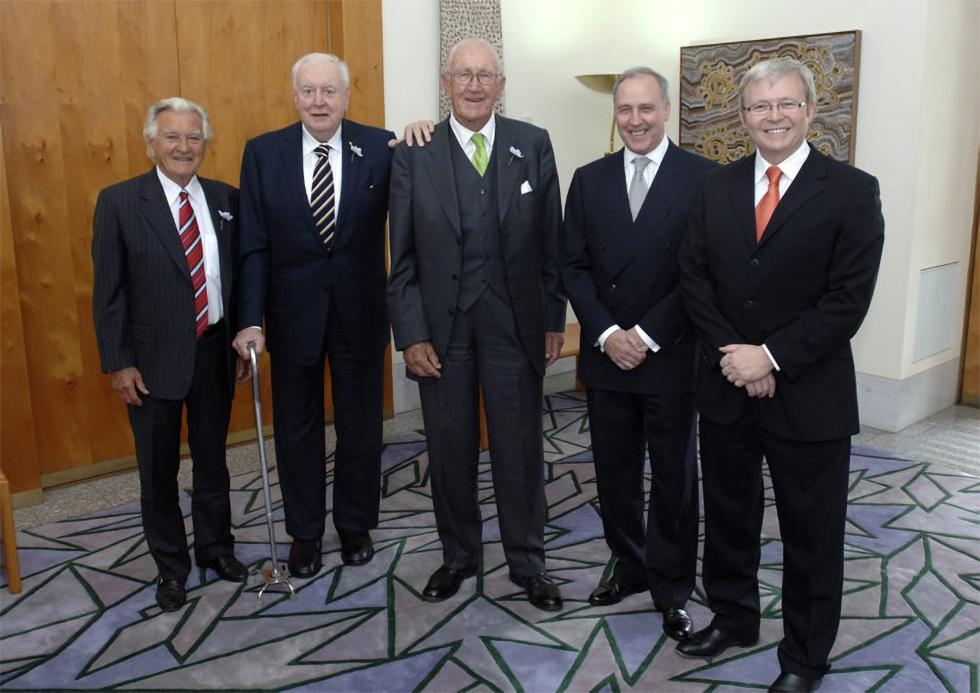
Former prime ministers Bob Hawke, Gough Whitlam, Malcolm Fraser and Paul Keating, and Prime Minister Kevin Rudd at the Apology to Australia’s Indigenous Peoples, Parliament House, Canberra, February 2008. AUSPIC
An ‘enduring liberal’, under subsequent governments Malcolm Fraser has continued to be a strong advocate for more humane policies on refugees arriving in Australia.
Fraser passed away on 20 March 2015.
Sources
- Ayres, Philip, Malcolm Fraser: A Biography, William Heinemann Australia, Melbourne, 1987.
- Fraser, Malcolm and Margaret Simons, Malcolm Fraser: The Political Memoirs, Melbourne University Press, 2010.
- Kelly, Paul, ‘Malcolm Fraser’, in Michelle Grattan (ed.), Australian Prime Ministers, New Holland, Sydney, 2000.
From the National Archives of Australia collection
- Commonwealth government records on Malcolm Fraser’s work up to 1981 are open to researchers. For more information, see Fact Sheet 246 (PDF 327KB).
- Records relating to the final two years of Malcolm Fraser’s prime ministership will open on 1 January 2012.
- Commonwealth records relating to Malcolm Fraser’s work after his prime ministership are still closed.


